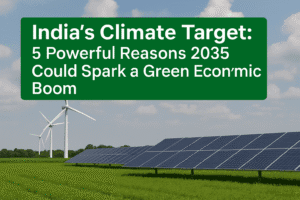India’s Climate Target: 5 Powerful Reasons 2035 Could Spark a Green Economic Boom
India’s upcoming 2035 climate target represents a strategic pivot, framing ambitious emissions reduction not as a burden, but as the core driver of future economic competitiveness and global leadership. This shift, highlighted in a pivotal New Delhi stakeholder discussion, positions the updated Nationally Determined Contribution (NDC) as a crucial investment roadmap, designed to mobilize private capital and de-risk innovation across critical sectors like industry, transport, and energy. Far exceeding mere compliance, the approach recognizes Indian businesses as essential partners, already demonstrating leadership through renewables, efficiency, and green finance.
The dialogue underscores that a well-structured NDC serves as a powerful signal to markets, aligning government policy with industry capability to unlock sustainable growth. Success hinges on translating sector-specific pathways into concrete policy enablers, fostering a symbiotic relationship where national climate goals fuel industrial advancement. This positions India to showcase at COP30 how a major developing economy can turn climate ambition into a foundation for resilient prosperity, capturing global market opportunities. The collaboration between government and business in crafting this target is now the defining test for achieving truly investible and transformative climate action.

The date – June 30th, 2025. The place – TERI, India Habitat Centre, New Delhi. The topic? Far more than just another climate policy discussion. The stakeholder dialogue on “India’s 2035 Climate Target: A Business Opportunity for Growth and Global Leadership” represents a potential turning point, where national climate strategy explicitly converges with the trajectory of Indian industry and economic ambition.
As India crafts its updated Nationally Determined Contribution (NDC) for COP30, the framing has decisively shifted. This isn’t merely about reducing emissions under international pressure; it’s being positioned as the blueprint for India’s next chapter of industrial competitiveness and sustainable prosperity. The joint brief by TERI and the We Mean Business Coalition, forming the basis of the discussion, makes this explicit: ambitious climate action is a core growth strategy.
Why This Moment Feels Different:
- From Compliance to Competitive Advantage: The dialogue moves beyond viewing climate targets as a burden. It squarely frames them as a catalyst for unlocking innovation, attracting clean capital, and positioning Indian companies as leaders in the rapidly decarbonizing global economy. The focus is on how climate action builds long-term value.
- The Private Sector as Co-Architect: Since the National Action Plan on Climate Change (NAPCC), Indian businesses have evolved from passive participants to essential drivers. This event acknowledges that scale and speed require deep industry buy-in and innovation. The “Business Call to Action” highlights tangible progress already underway – from massive renewable energy deployments and leaps in energy efficiency to pioneering green finance and nature-positive models.
- NDCs as Investment Signals: A critical insight underpinning the discussion is the power of a well-structured NDC. It’s not just a promise to the UN; it’s a roadmap for the market. Clear, ambitious sectoral targets (power, heavy industry, transport, nature-based solutions) reduce uncertainty. They signal where policy support will flow, de-risk investments in emerging technologies, and mobilize the trillions needed for a systemic transition. Businesses are hungry for this clarity.
- Specificity is Key: The brief’s strength lies in its actionable, sector-specific recommendations. Generic goals won’t cut it. Success hinges on tailored pathways for decarbonizing steel, cement, and chemicals; accelerating EV adoption and green hydrogen; modernizing the grid; and scaling regenerative agriculture and forestry. This granularity transforms ambition into executable strategy.
- Global Leadership Rooted in Domestic Action: India’s voice on the global climate stage carries immense weight. This dialogue recognizes that credible global leadership stems from demonstrable domestic action aligned with development needs. A robust 2035 NDC, shaped with industry input, becomes India’s most powerful diplomatic asset at COP30 and beyond.
The Real Human Insight: The Boardroom is Listening
The significance of this stakeholder discussion lies in its participants: senior government officials, key ministries, and top business leaders. This convergence is rare and vital. It reflects a growing, pragmatic realization on both sides:
- Government understands: Achieving unprecedented scale in renewable energy, green infrastructure, and industrial transformation requires private capital and expertise. Policy alone is insufficient without market forces aligned behind it.
- Business understands: The low-carbon transition is inevitable. Companies leading in efficiency, clean tech, and sustainable supply chains will gain market share, attract investment, and future-proof their operations. Policy clarity accelerates this shift from risk mitigation to opportunity capture.
The Value for Readers: Seeing the Opportunity Map
For business leaders and investors, this dialogue signals where the Indian government intends to focus its policy levers and support mechanisms in the coming decade. It’s a preview of the future investment landscape.
For policymakers, it’s evidence that ambitious climate targets can be designed as economic drivers, not constraints, with industry ready to engage constructively.
For citizens and observers, it underscores that India’s climate journey is increasingly intertwined with its economic destiny – aiming for growth that is resilient, clean, and positions the nation as a 21st-century industrial leader.
The Road to COP30 Starts in New Delhi
The June 30th discussion isn’t just a meeting; it’s a test. Can India craft an NDC that truly serves as that “roadmap for inclusive, investible and high-impact climate ambition”? One that excites boardrooms as much as conference rooms? If the insights from TERI, We Mean Business, and the assembled stakeholders translate into bold, collaborative policy design, India won’t just submit an updated target. It could ignite an economic transformation with global resonance. The world isn’t just watching India’s emissions; it’s watching how a major developing economy redefines growth itself.
You must be logged in to post a comment.